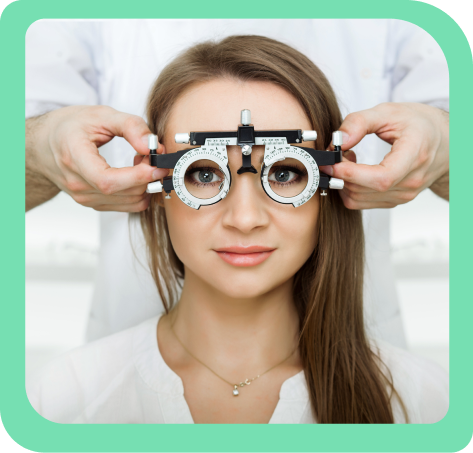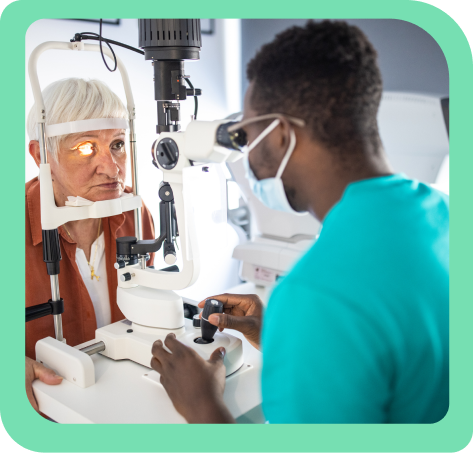
Secure your health, Protect your future
Why get a vision insurance plan with ProvideSure
Short-term health insurance is designed to cater to a variety of individuals and families who may find themselves in need of temporary, limited healthcare coverage.

Routine vision care
Plans generally cover some or all of the costs for routine eye exams.
Lower overall costs
A vision insurance plan may reduce your out-of-pocket costs for eye care.
Maximize benefits
Receive discounts on vision expense like glasses or even LASIK.
Ongoing support
Have questions? Our licensed agents have answers for you.
Have Insurance Questions?
Chat with an expert below.
Why get a vision insurance plan with ProvideSure
Vision Insurance insurance is designed to cater to a variety of individuals and families who may find themselves in need of eye wear or routine vision care.

Routine vision care
Plans generally cover some or all of the costs for routine eye exams.
Lower overall costs
A vision insurance plan may reduce your out-of-pocket costs for eye care.
Maximize benefits
Receive discounts on vision expense like glasses or even LASIK.
Ongoing support
Have questions? Our licensed agents have answers for you.
Benefits
Benefits of vision insurance
| May Include: | Basic insurance plan | Vision discount plan | Typical health plan |
| Annual routine eye exam | ✔ | ✔ | |
| Eyeglass frames / leanses and contacts | ✔ | ✔ | |
| Pre-determined discounts on all vision-related expenses | ✔ | ✔ | |
| Balance paid by plan with required copayment | ✔ | ||
| Eye care for major medical problems | ✔ | ✔ | ✔ |
What is vision insurance?
Vision insurance can help you cover some of the cost of maintaining healthy vision, such as routine eye exams and contact lens fittings. However, Its important to look around to find the right plan for you.
Depending on the type of policy you have, you will typically have to pay at least a portion of the cost for eyeglasses and contact lenses.
LASIK, PRK and other vision correction surgery have become more mainstream over the past several years. Therefore some vision insurance will also cover part of the cost or provide a discount for these services.
If you have an eye disease or chronic condition, you will probably receive care under your medical insurance not your vision insurance. For example, cataracts, glaucoma and other eye diseases typically do not fall under vision insurance. Instead, you would file a claim with your health insurance company.

What does vision insurance cover?
Vision insurance typically covers a range of eye care services and products. Here are some common areas that vision insurance plans often cover:
- Eye Exams: Most vision insurance plans cover regular eye exams, which may include tests to check your vision and overall eye health.
- Prescription Glasses: Coverage usually includes lenses and frames. Some plans offer a specific allowance for frames, while others may cover a set amount of the cost.
- Contact Lenses: Vision insurance may cover the cost of contact lenses or provide an allowance toward their purchase. This may also include the fitting and follow-up visits.
Coverage specifics can vary widely between different insurance providers and plans, so it’s important to review the details of any vision insurance policy to understand exactly what is covered

How do I get vision insurance?
You can receive vision insurance through ProvideSure. We offer both individual and family plans and you can even get coverage for your small business employees. We’ll start by pairing you with the right plan to meet your needs.
If you’re looking for coverage for your own eyecare, we can set you up with an individual plan that offers discounts and affordable premiums. On the other hand, if you have recently married or have young children ready for their first eye exam, we can set you up with family vision insurance to ensure you see each precious memory. If you’re looking for a way to stay competitive, vision coverage for your employees is a great way to stand out from other companies.

FAQs
Vision Insurance FAQs
Regular eye exams are important for several reasons:
- Vision Correction: Eye exams can determine if you need glasses or contact lenses, and they help ensure that your prescription is up to date.
- Eye Health: They can detect signs of eye diseases like glaucoma, macular degeneration, and cataracts, often before you experience any symptoms.
- Overall Health: Eye exams can sometimes reveal underlying health conditions such as diabetes or high blood pressure, as the eyes are closely connected to overall health.
- Preventing Vision Loss: Early detection and treatment of eye issues can help prevent or minimize vision loss.
- Comfort and Quality of Life: Addressing issues like eye strain or dryness can significantly improve your comfort and daily visual experience.
Even if you feel like your vision is fine, a regular check-up is a good preventive measure. How often you should have an eye exam can depend on your age, health, and any symptoms you might have.
The eye doctor will measure your eye shape and tear film to determine the best contact lens diameter and base curve for your eyes.
The cost of vision insurance can vary depending on several factors, including the provider, the level of coverage, and your location. Generally, vision insurance plans range from around $10 to $30 per month per person.
Yes, you can often bundle vision, dental, and health insurance together. Many insurance providers and employers offer packages that include all three types of coverage, which can be convenient and sometimes more cost-effective.
Choosing the right vision insurance plan involves evaluating your specific needs, understanding the coverage options, and comparing different plans.

